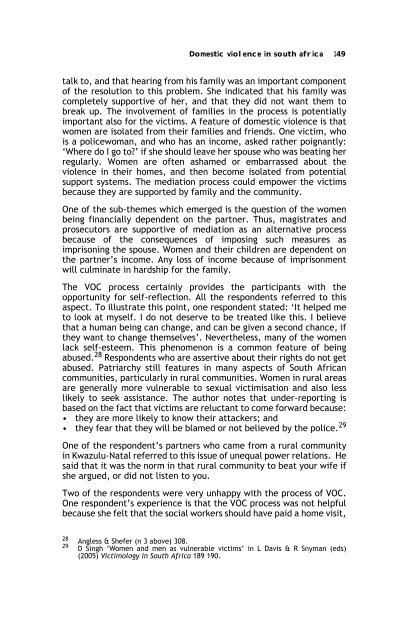Sex, Gender, Becoming - PULP
Sex, Gender, Becoming - PULP
Sex, Gender, Becoming - PULP
Create successful ePaper yourself
Turn your PDF publications into a flip-book with our unique Google optimized e-Paper software.
Domestic violence in south africa 149<br />
talk to, and that hearing from his family was an important component<br />
of the resolution to this problem. She indicated that his family was<br />
completely supportive of her, and that they did not want them to<br />
break up. The involvement of families in the process is potentially<br />
important also for the victims. A feature of domestic violence is that<br />
women are isolated from their families and friends. One victim, who<br />
is a policewoman, and who has an income, asked rather poignantly:<br />
‘Where do I go to?’ if she should leave her spouse who was beating her<br />
regularly. Women are often ashamed or embarrassed about the<br />
violence in their homes, and then become isolated from potential<br />
support systems. The mediation process could empower the victims<br />
because they are supported by family and the community.<br />
One of the sub-themes which emerged is the question of the women<br />
being financially dependent on the partner. Thus, magistrates and<br />
prosecutors are supportive of mediation as an alternative process<br />
because of the consequences of imposing such measures as<br />
imprisoning the spouse. Women and their children are dependent on<br />
the partner’s income. Any loss of income because of imprisonment<br />
will culminate in hardship for the family.<br />
The VOC process certainly provides the participants with the<br />
opportunity for self-reflection. All the respondents referred to this<br />
aspect. To illustrate this point, one respondent stated: ‘It helped me<br />
to look at myself. I do not deserve to be treated like this. I believe<br />
that a human being can change, and can be given a second chance, if<br />
they want to change themselves’. Nevertheless, many of the women<br />
lack self-esteem. This phenomenon is a common feature of being<br />
abused. 28 Respondents who are assertive about their rights do not get<br />
abused. Patriarchy still features in many aspects of South African<br />
communities, particularly in rural communities. Women in rural areas<br />
are generally more vulnerable to sexual victimisation and also less<br />
likely to seek assistance. The author notes that under-reporting is<br />
based on the fact that victims are reluctant to come forward because:<br />
• they are more likely to know their attackers; and<br />
• they fear that they will be blamed or not believed by the police. 29<br />
One of the respondent’s partners who came from a rural community<br />
in Kwazulu-Natal referred to this issue of unequal power relations. He<br />
said that it was the norm in that rural community to beat your wife if<br />
she argued, or did not listen to you.<br />
Two of the respondents were very unhappy with the process of VOC.<br />
One respondent’s experience is that the VOC process was not helpful<br />
because she felt that the social workers should have paid a home visit,<br />
28 Angless & Shefer (n 3 above) 308.<br />
29<br />
D Singh ‘Women and men as vulnerable victims’ in L Davis & R Snyman (eds)<br />
(2005) Victimology in South Africa 189 190.
















